Here we have collected further tips and information on various topics.
Advice: Free help for migrants
There are many places in Leipzig where you can get help and information. It's free.
They are called 'advice centers' because such help is often called advice.
We have already mentioned some of them elsewhere on this page.
For example, the advice center for labor law or pregnancy.
If you need help with a form or need to contact an authority, you don't have to pay any money. There are counseling centers for that.
The consultation is confidential. This means your personal information and history will remain with the organization. The staff will not share your information with anyone else.
Some counseling centers are specifically for people who are not from Germany. The website afeefa provides a good overview in various languages of where you can get advice on various topics. You'll also find events and other opportunities to meet people there.
A good place to start with questions is the Leipzig Welcome Center.
No appointment is necessary. Video interpretation is available in many languages.
The address is Otto-Schill-Str. 2 (in the center, tram stop 'Thomaskirche')
Here you can see the current opening hours.
There's also general migration advice for people in Leipzig who come from other countries. There, you can ask questions or get help, for example, contacting an authority.
For adults 27 and older, there is the MBE (Migration Counseling for Adult Immigrants). There are six organizations in Leipzig that offer this service:
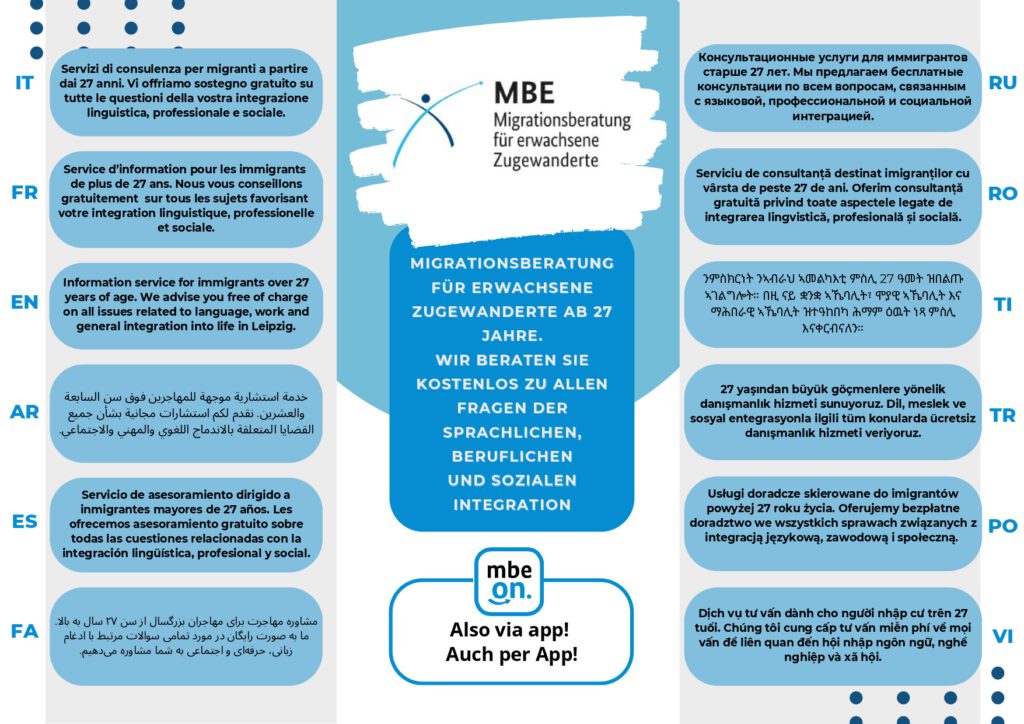
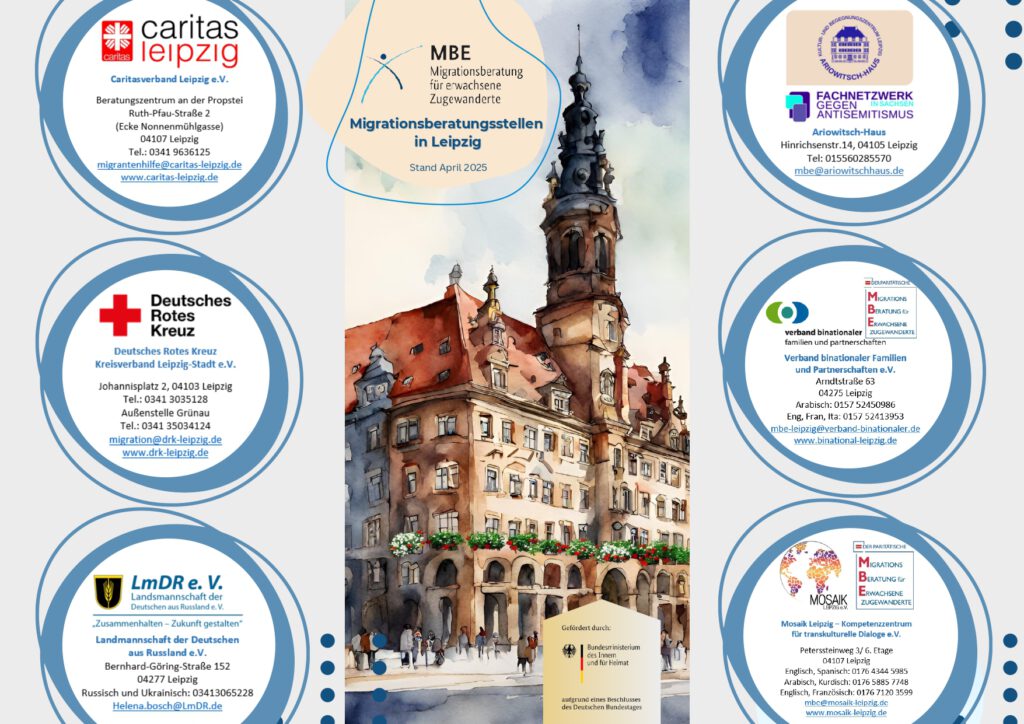
For people between the ages of 12 and 27, there's the JMD (Youth Migration Service). The JMD can help you especially well with questions about school, training, university studies, and career orientation, as well as with many other topics.
There are two organizations that offer this in Leipzig, Internationaler Bund and Naomi:
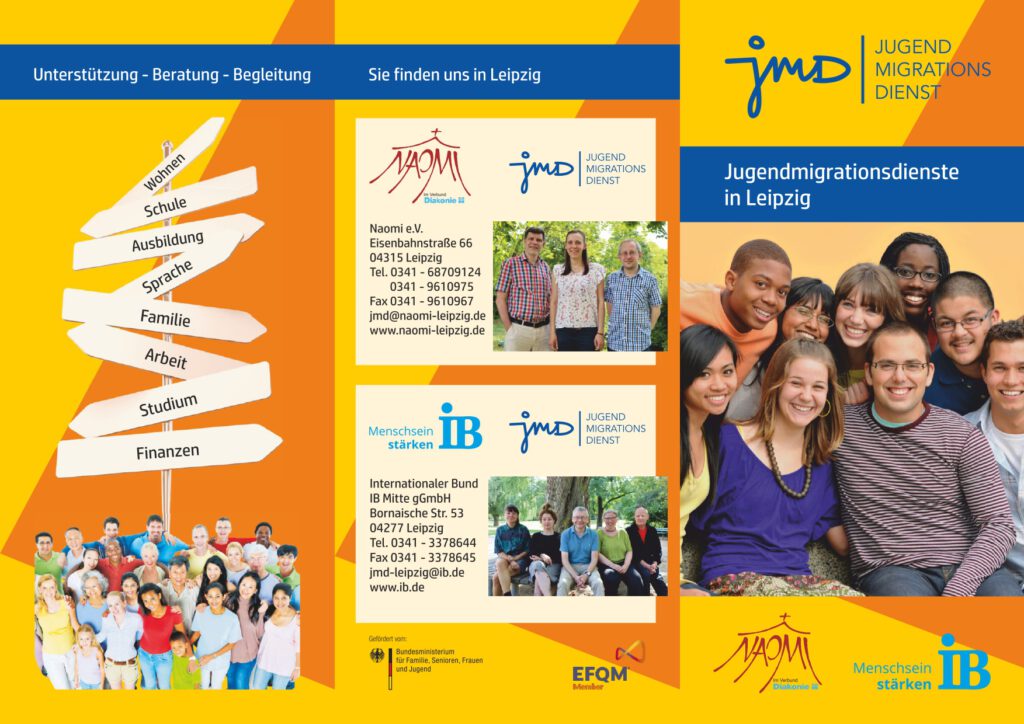
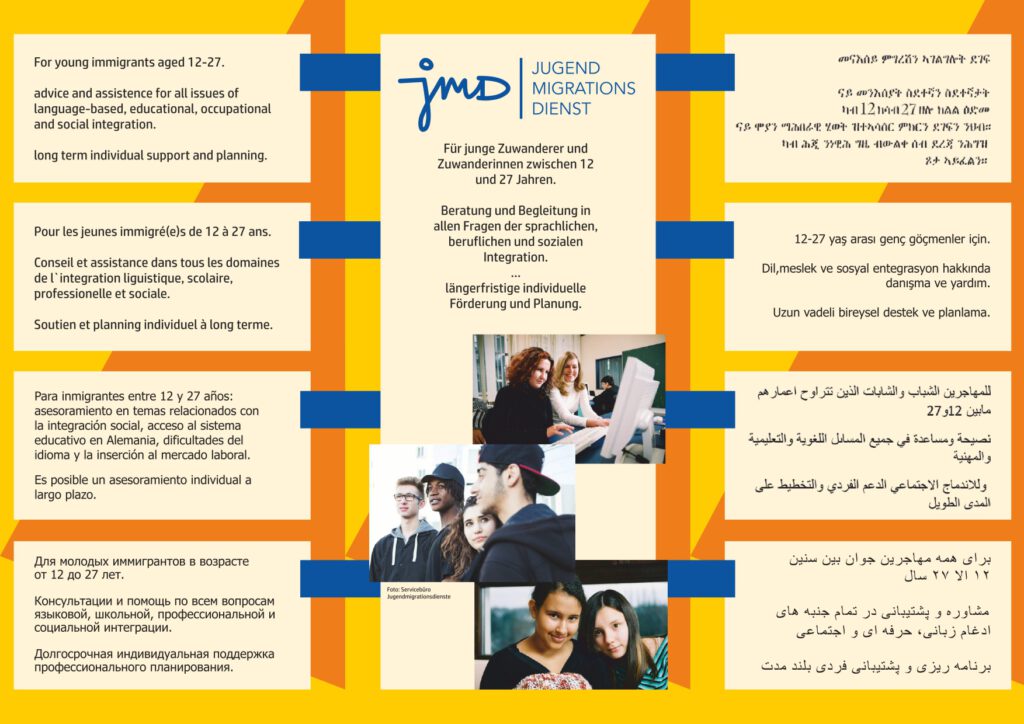
Both services also offer online counseling. You can ask questions via chat and receive answers there. The counselors speak several languages. It's anonymous, data secure, and free of charge. The MBE app is available. mbeon and for the JMD there is the website jmd4you.
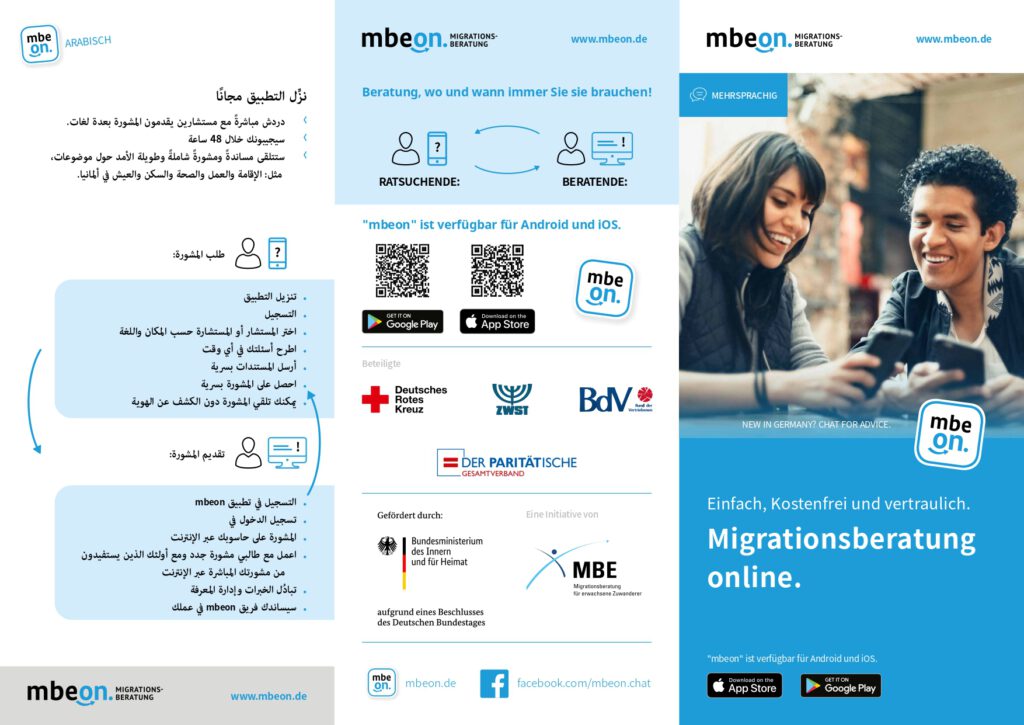
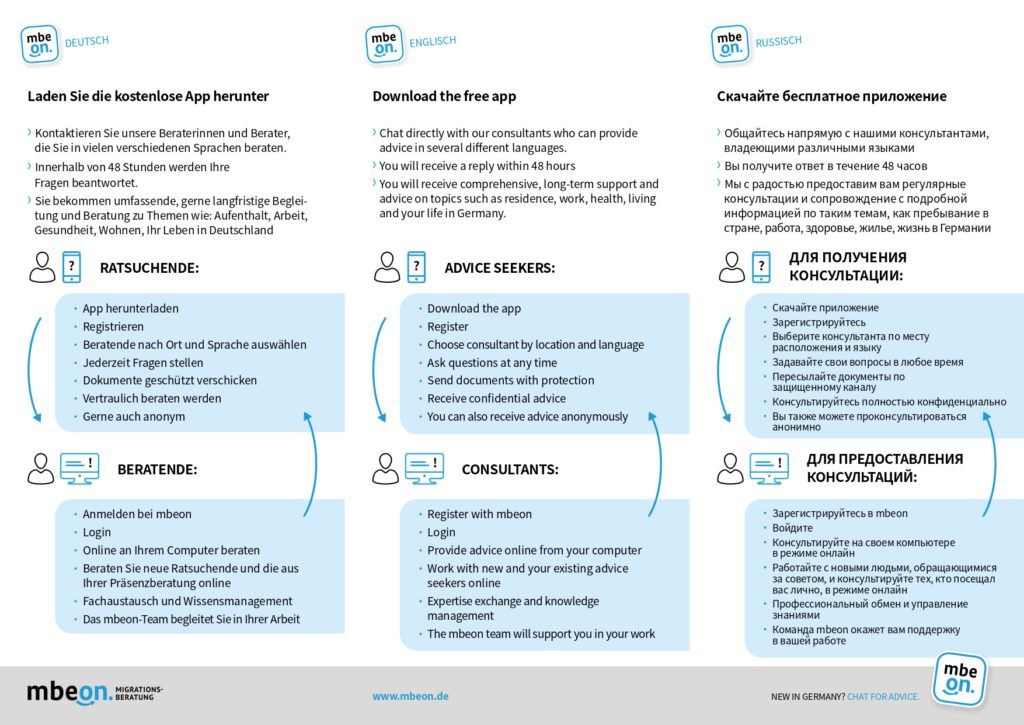
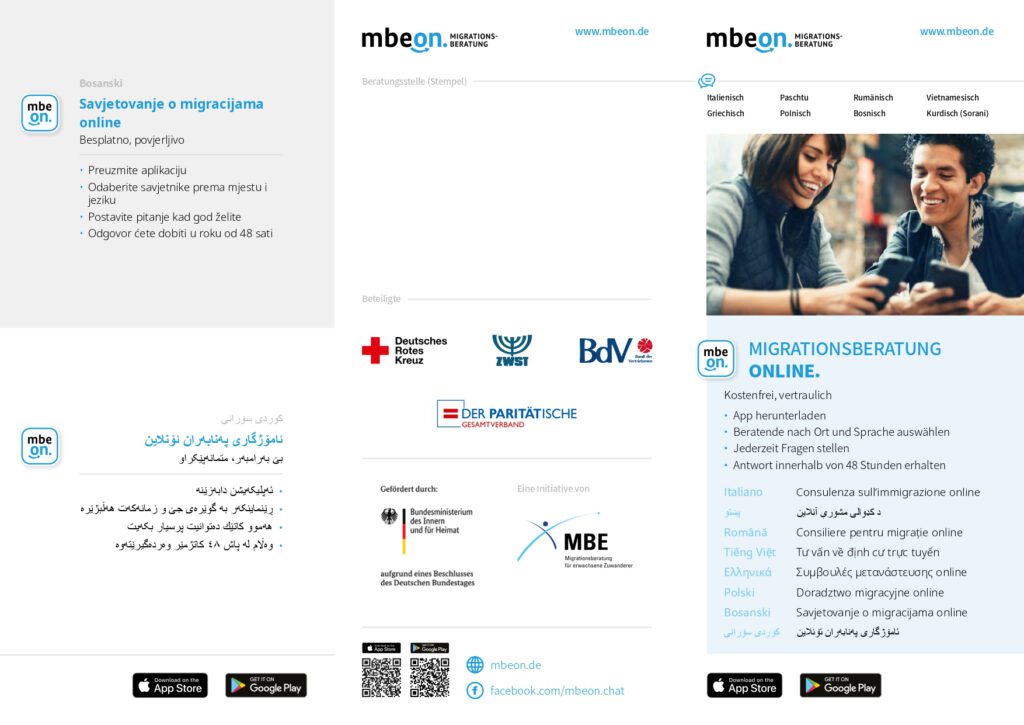
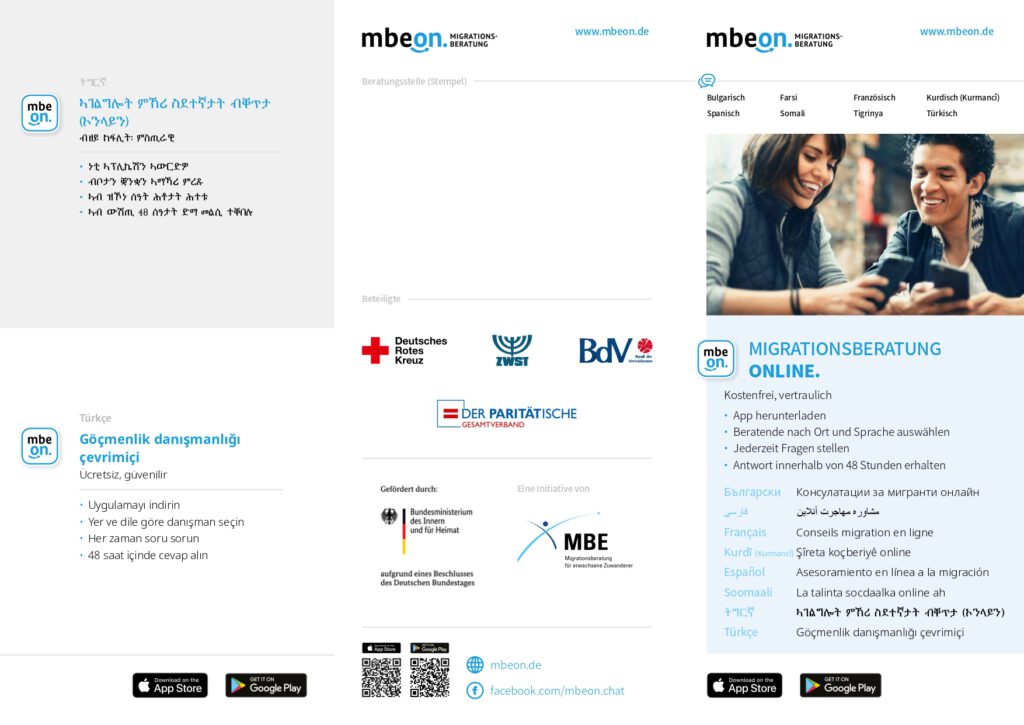
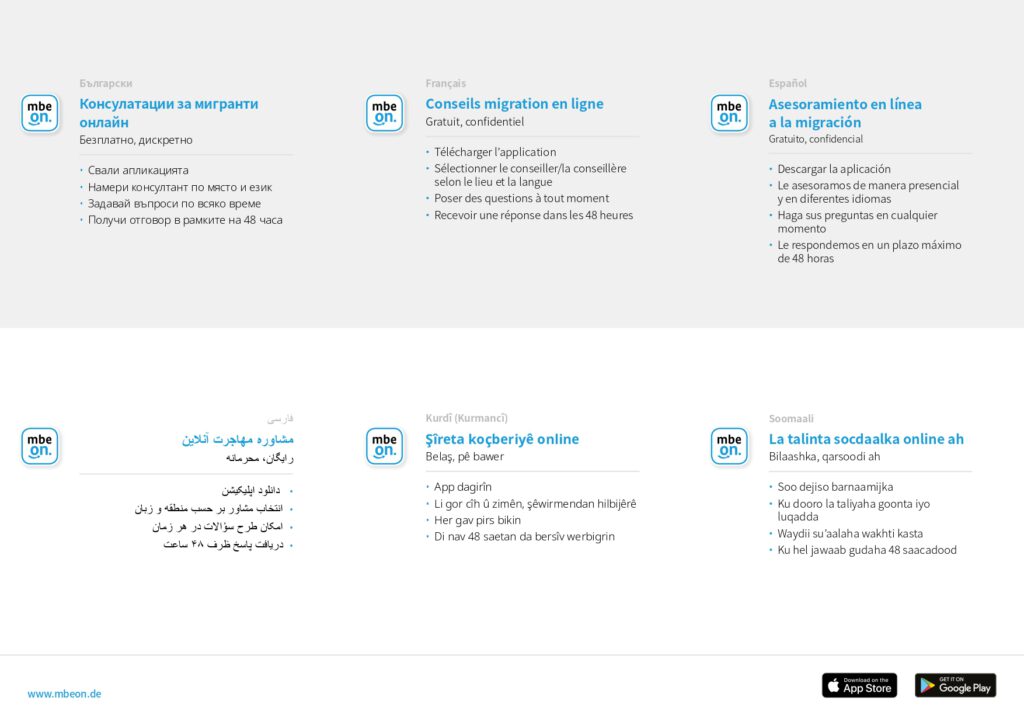
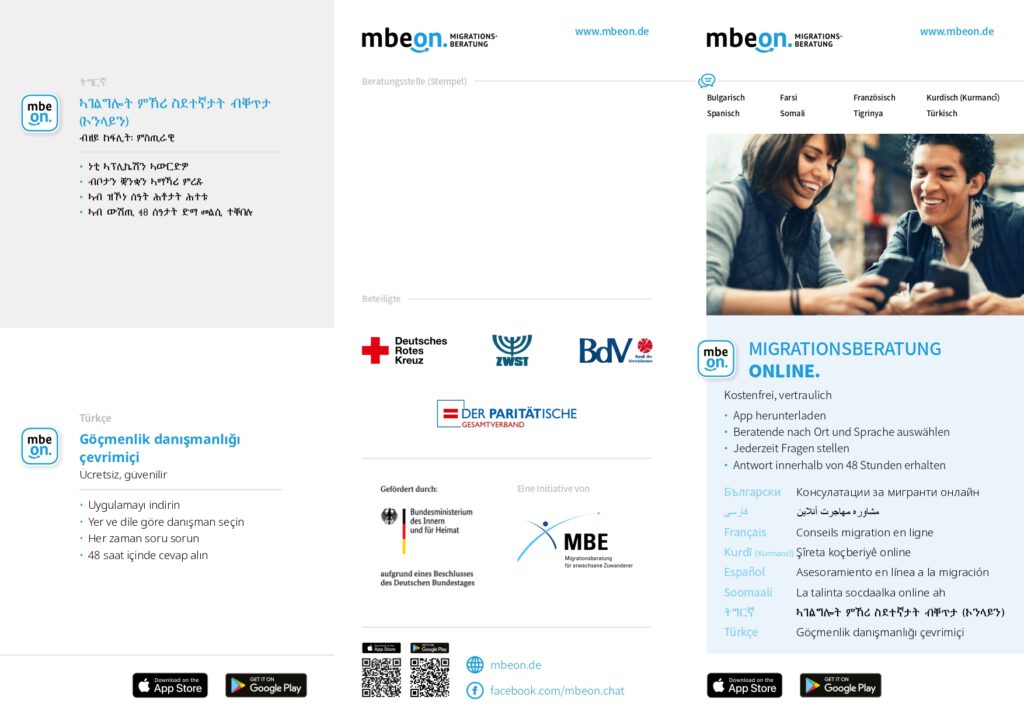
Online translations
If you don't understand something in German, you can translate it online. On websites like Google Translate or DeepL The text is translated automatically. The quality isn't perfect, and automatic translations can make mistakes. But the tools allow you to understand what a text is about relatively well. Google Translate can even translate an entire website. You copy the website address into the field on the left, and the web page will be translated on the right. AI (artificial intelligence) tools like Chat GPT can also translate text well.
Sometimes the texts in German are very complicated, and even more so in your native language. If it's still unclear, ask a counseling center.
You can also use such tools to translate texts into German.
Important: Do not enter any personal information into such online tools. Personal information includes, for example, name, date of birth, address, telephone number, photos, bank account details, insurance number, passport number, and government file number. Such data is not secure when using online tools.
I feel discriminated against and/or am the victim of a crime. Where can I get help?
In Germany there is a law that protects people from discrimination.
This is called the 'General Equal Treatment Act' (AGG). Here There is a simple explanation for this.
If you feel discriminated against and would like to discuss it with someone, there is the Saxony Anti-Discrimination Office (ADB). The ADB has an office in Leipzig.
Here you can see how to contact the ADB and what the ADB does.
At the RAA Leipzig There is a victim counseling service. You will receive support there if you are affected by verbal or physical violence or discrimination. The staff can explain the legal situation, contact authorities, and organize financial assistance.


A specific type of discrimination is antigypsyism.
This is discrimination against Rom*nja and Sinti*zze (Roma and Sinti).
In such cases you can also go to the ADB.
But there is also a place in Leipzig where you can report this discrimination.
This is what the organization Romano Sumnal, that helps these people. Here There are flyers available in various languages.
I am an EU citizen. Where can I get more information about my rights and obligations in Germany?
There is an EU service that can help you if you have difficulties with authorities in Germany.
That means SOLVIT and helps when an authority fails to comply with EU law. SOLVIT works with you and the authority to find a solution. It is available in all EU languages.
The EU Equality Body is an office in Germany that provides information to people from other EU countries. Its website explains a lot about the right of residence for EU citizens in Germany. This right is called the right of freedom of movement.
But there is also information on other topics such as social security or labor law.
The Page is available in many EU languages.
These videos explain residence and social security law for EU citizens and their families in Germany. Subtitles are available in various languages.
I need legal advice and I don't have that much money.
Free legal advice
As already mentioned, there are various advice centers in Leipzig on many topics.
The staff at a counseling center can help you:
- to explain complex issues,
- Fill out forms and letters,
- Contact authorities.
👉 Important: A counseling center may no legal advice or representation This can only be done by aa lawyerIf your request has legal aspects, you need a legal advice.
If you need legal advice and don't have enough money for a lawyer, you can get it for free.
There are three locations in Leipzig where free legal advice is available.
You must provide proof that you don't have that much income. For example, your pay slip or a notice from the social welfare office/job center.
You don't need an appointment. You will receive an initial legal assessment of your situation. The consultation is usually in German. If you need someone to translate for this or other consultation topics, you can contact us online at Leipzig Helps Interpreting questions.
| Leipzig | Leipzig Citizens' Office Otto-Schill-Straße 2 04109 Leipzig | every Friday from 1 p.m. to 3 p.m. |
| Leipzig | Leipzig District Court Room 063 Bernhard-Göring-Straße 64 04275 Leipzig | every Tuesday from 3 p.m. to 5 p.m. |
| Leipzig | Paunsdorf District Management Platanenstraße 11 04329 Leipzig | every even weeks Wednesday 4 pm to 6 pm |
There is also regular free legal advice for specific groups:
- Students in Leipzig can go to the legal advice centre on Tuesdays from 15:00 to 18:00. Student Union go
- For women with questions about family law, there is a legal advice service by telephone every last Monday of the month from 6 p.m. to 8 p.m. Lifetimes. You must register for this.
- Refugee Law Clinic Leipzig offers legal advice on the asylum procedure
- Law & Legal is a free student legal advice service on various topics
- The Unemployed initiative Leipzig offers free legal advice, particularly in the area of social law (Jobcenter), but also on other topics
- At the Youth Welfare Office Leipzig You can get legal advice on issues such as joint custody, paternity determination, maintenance claims
For other topics, there is the possibility of obtaining legal advice through a fee or membership:
- Labor law: Employee Assistance Leipzig (membership 40 euros per year)
- Social law: Social Association VDK (Membership 90 euros per year)
- Tenancy law: Tenants' Association Leipzig (Membership costs €84 per year plus a €10 joining fee. If you receive citizen's allowance from the Jobcenter or social assistance from the Social Welfare Office, you can request a 'certificate of eligibility' for the tenants' association. This makes membership free.)
- Consumer law: Consumer Advice Center (Fee 30 euros)
Legal aid, legal costs aid and procedural aid
For this purpose, there is the option of applying for legal aid. Legal aid offers people the opportunity to speak in detail with a specialist lawyer. Legal aid is for people with low incomes. For example, you want to separate from your husband, don't have much money, and are looking for advice from a family law attorney. This official site explains it easily.
If you need legal advice, please apply to the Leipzig District Court (Bernhard-Göring-Straße 64). Here is the application form. You fill it out and submit it with proof of your income. There are instructions for completing the application for German and on EnglishThere is also an office located in the district court where you can get help with the application. The office is called 'Legal Advice Office' and is on the ground floor. If your application is approved, you will receive a 'consultation certificate'. With this certificate, you can make an appointment with a lawyer.
If the matter comes to civil or family proceedings, you can also receive free legal representation. In civil proceedings, this is called 'legal aid' (PKH), and in family proceedings, it is called 'procedural aid'. You make the Application on this assistance also at the district court.
Here There is a lawyer search for Saxony. There you can also search for lawyers with knowledge of various foreign languages. There is also the Nationwide Official Lawyers Directory, where you can search for lawyers throughout Germany in German and English.
There is also an insurance policy for legal matters in Germany. It is called 'Rechtsschutzversicherung'. This Article from the consumer advice center provides a good, neutral overview of how the insurance works.